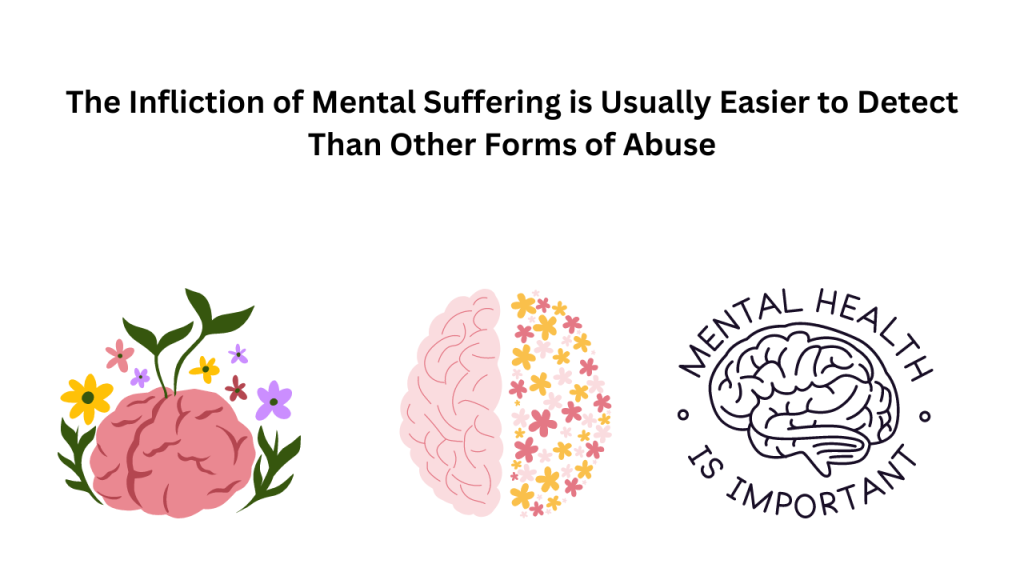 The Infliction of Mental Suffering is Usually Easier to Detect Than Other Forms of Abuse
The Infliction of Mental Suffering is Usually Easier to Detect Than Other Forms of Abuse
Have you ever sensed that something wasn’t quite right with a friend or loved one? Maybe they seemed distant, overly anxious, or their self-esteem appeared to be crumbling before your eyes. If you’ve ever noticed these subtle signs, you might have witnessed the infliction of mental suffering. Unlike physical abuse, which leaves visible scars, mental abuse can be more insidious but often easier to detect if you know what to look for. Let’s dive into the nuances of this form of abuse and learn how to recognize and address it.
Understanding Mental Suffering
What Is Mental Suffering?
Mental suffering, also known as psychological or emotional abuse, involves a person subjecting another to behavior that results in psychological trauma, including anxiety, chronic depression, or post-traumatic stress disorder. Unlike physical abuse, the signs are not always visible, but the impact can be just as, if not more, damaging.
Common Forms of Mental Suffering
Mental suffering can take various forms, such as verbal assaults, threats, humiliation, and manipulation. These actions chip away at a person’s mental health, often leaving them feeling worthless, isolated, and fearful.
Why Is Mental Suffering Easier to Detect?
Observable Behavioral Changes
While physical abuse leaves visible marks, mental suffering manifests in changes in behavior and personality. For example, a once outgoing and confident person may become withdrawn and anxious. These changes are often noticeable to friends and family, making mental suffering easier to detect.
Emotional Reactions
Victims of mental abuse often exhibit strong emotional reactions such as crying, panic attacks, or excessive worry. These reactions can be easier to observe and recognize as signs of distress.
Communication Patterns
Changes in communication patterns, such as reluctance to speak, avoiding eye contact, or constantly seeking reassurance, can indicate that a person is experiencing mental suffering. These patterns are often noticeable in everyday interactions.
Recognizing the Signs of Mental Suffering
Emotional Instability
Frequent mood swings, unexplained anger, or bouts of crying can be signs of emotional abuse. If someone you know is experiencing these symptoms, it’s important to pay attention and offer support.
Withdrawal from Social Activities
Victims of mental suffering often isolate themselves from friends and family. If a loved one suddenly stops participating in social activities they once enjoyed, it could be a red flag.
Changes in Self-Esteem
Mental abuse often targets a person’s self-esteem. Look for signs of diminished self-worth, such as negative self-talk, reluctance to take on challenges, or an overly apologetic demeanor.
The Impact of Mental Suffering
Long-Term Psychological Effects
Mental suffering can lead to long-term psychological issues, including anxiety, depression, and PTSD. These conditions can have a profound impact on a person’s quality of life and their ability to function daily.
Physical Health Consequences
The stress and anxiety caused by mental suffering can also take a toll on physical health. Common symptoms include headaches, gastrointestinal issues, and a weakened immune system.
Impact on Relationships
Mental abuse can strain relationships, leading to isolation and loneliness. Victims may struggle to trust others, making it difficult to form and maintain healthy relationships.
Addressing Mental Suffering
Offering Support
If you suspect someone is experiencing mental suffering, the best thing you can do is offer your support. Listen without judgment, validate their feelings, and encourage them to seek professional help.
Encouraging Professional Help
Mental suffering often requires the intervention of a mental health professional. Encourage your loved one to seek therapy or counseling to address the underlying issues and develop coping strategies.
Promoting Awareness
Raising awareness about the signs and impact of mental suffering can help prevent it. Educate yourself and others about mental abuse and advocate for supportive resources and services.
How to Protect Yourself
Setting Boundaries
One of the most effective ways to protect yourself from mental suffering is to establish clear boundaries. Communicate your limits and ensure they are respected by those around you.
Seeking Support
If you find yourself in a situation where you are experiencing mental suffering, seek support from trusted friends, family members, or professionals. Don’t hesitate to ask for help.
Practicing Self-Care
Taking care of your mental health is crucial. Engage in activities that bring you joy, practice mindfulness, and prioritize self-care to maintain your emotional well-being.
Real-Life Stories
Sarah’s Story
Sarah, a successful marketing executive, seemed to have it all. But behind closed doors, she was dealing with an emotionally abusive partner. Her once vibrant personality faded, replaced by anxiety and self-doubt. With the support of friends and therapy, Sarah found the strength to leave the toxic relationship and rebuild her life.
Mark’s Journey
Mark, a college student, experienced mental abuse from a close friend who constantly belittled him. The constant criticism eroded his self-esteem, and he began to withdraw from social activities. With the help of a counselor, Mark learned to recognize the abuse and distance himself from the toxic friendship.
The Importance of Empathy
Understanding the Victim’s Perspective
Empathy is key in understanding and supporting victims of mental suffering. Put yourself in their shoes, listen to their experiences, and offer compassion and support.
Creating a Safe Environment
Creating a safe and supportive environment can make a significant difference for someone experiencing mental suffering. Encourage open communication and provide a non-judgmental space for them to express their feelings.
Conclusion: Be the Change
Mental suffering is a serious issue that can have profound and lasting effects. By recognizing the signs, offering support, and promoting awareness, we can make a difference in the lives of those affected. Remember, your empathy and understanding can be a powerful tool in helping someone heal. Have you noticed signs of mental suffering in someone you know? Reach out, offer support, and be the change they need.
